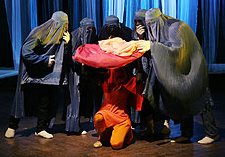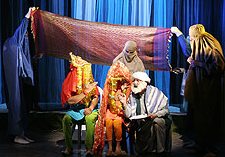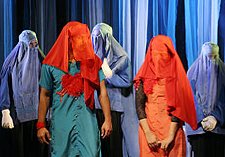Guest Post by Omer Alvie
[This satirical account is inspired by the real-life drama about the Ajoka play Burqavaganza in the Pakistan capital; See The News Editorial; Gulf News op-ed; a Daily Times report on the original play, and other press coverage.]
So this is how it all happened. Ajoka, a non-commercial theatre group committed to the cause of social change in Pakistan, unveiled its new play Burqavaganza last month in Lahore. The satirical play, written by Shahid Nadeem, addresses the issue of the burqa (veil) and highlights the double-standards and hypocrisy of the feudal/tribal mindset. The aim was to use humour and satire to challenge the cultural status quo and to provoke people to think for themselves.
The audience thoroughly enjoyed the show and the play received positive reviews in the press. But the most surprising response to the play came from a rather astute group of individuals belonging to the MMA (more popularly known as Mullah Military Alliance). Inspired by the success of the Burqavaganza, five extremely talented MNAs decided to perform their own impromptu over-the-top ‘dramaâ⠂¬Ëœ in the National Assembly. The play imaginatively titled Fanativaganza (by yours truly), was a staged rebuttal to the Ajoka group’s play.
Substituting the use of satire, the inspired MNAs opted for provocative language and violent hand gestures to ridicule the writer of Burqvaganza and the Director of the Ajoka theatre group. Apparently, to these five highly sensitive and pious individuals, the Burqavaganza play was clearly un-Islamic, enough to be classified as blasphemous. Although, it has to be clarified that these days, any critique, criticism, aspersion, censure, swipe or nitpicking of the norms and practices of these religious extremists will likely lead to a blasphemy charge, even if it is a comment regarding the general unruliness of their beards.
One minor clarification here, they cannot be called religious fundamentalists. This is because they fail to grasp the fundamentals of the religion they claim to be following. ‘Nuttersâà ¢â€šÂ¬Ã¢â€žÂ¢ is more appropriate and generally my preference.
The MNA performed drama did not get a positive response from the public or the press, but it did manage to get a standing ovation from the Minister of Culture, who subsequently announced a government ban on the Burqavaganza play to show his appreciation for the drama queens of the national assembly. He was so moved by the MMA performance that he additionally promised further government actions against the key members of the Ajoka Theatre group. I have to admit, as a Pakistani citizen, hearing this news brought a lump to my throat. It wasn’t that I was emotional, it just happened to be part of the process of me regurgitating my last meal, as I got sick to my stomach.
It is clear now that the government’s attempt at promoting ‘enlightened moderation’ in reference to religion has not been very successful. Actually, that is an understatement; it has been an unquestionable, resounding failure. I do admit though that they have managed to create an era of (religious) ‘moderated enlightenment� �. When your faith is judged by the size of your beard or measured by the length of your veil, you are in serious, serious trouble!
Omer Alvie is a Pakistani residing in the UAE and writes, often satirically, on his blog The Olive Ream. He also writes about the Pakistani blog scene at Global Voices. This post was first published at The Olive Ream.























































Pervaiz Munir Alvi bhai … you’ve made a valid point although it’s the other way around. The non-religous secularists are imposing their ideals on the religous with such antics.
I have no problems at all with anyone wearing a burqa. I onlz have a problem with people here and elsewhere sermoning me about what I should wear.
Â
[quote post=”712″]Why to impose ones own religious or non-religious orientations on others.[/quote].
Now it’s balanced.
This debate on “Burqa” shows where we are stuck. Arguing about what happened or did not happen in Arabia fifteen centuries ago. No wonder we are a backward nation. If a woman wants to wear a burqa or chador or what ever, she should be able to do that. In the West Christian Nuns do that to some extent. And if a women does not want to wear any of these head gears she should be able to do that too. Some people follow their religion to the last word while some do not. Why to impose ones own religious orientations on others.
In the Quran, Surah al-Ahzab ayah 59 (33:59) says:
Ya ayyuha an-Nabiyy qul li azwajika wa banatika wa nisa al-mu’minin yudnina alayhinna min jalabib hinna; dhalika adna an yu’rafna fa laa yu’dhayn. Wa kana Allahu Ghafur Rahim
O Prophet! Say to your wives and your daughters and the women of the faithful to draw their JALABIB close around them; that is better that they will be recognized and not annoyed. And God is ever Forgiving, Gentle.
The word “jalabib” is the plural of “jilbab”. Clearly, this ayah states a command for Muslim women to wear a garment which Allah SWT has called “jilbab”.
Beyond this, the hadiths record how the sahabiyat (rAa) went about obeying Surah al-Ahzab ayah 59 when it was revealed:
Sunan Abu Dawud Book 32 #4090. Narrated Umm Salama, Umm al-Mu’minin: When the verse, “That they should draw their jalabib close around them” was revealed, the women of Ansar came out as if they had crows over their heads by wearing jalabib.
In case there is any confusion about how the Muslim sister is supposed to go about obeying Surah al-Ahzab ayah 59, this hadith shows that the correct way to obey it is to wear the garment called “jilbab”, since that is what the sahabiyat (rAa) did. Note that they did not hesitate or delay or make excuses: when they were told by Allah SWT to wear the garment called “jilbab”, they did, right away.
And there is more even than this. Some of the women remained in seclusion and never went out so that they did not own the garment called “jilbab”. The hadiths record that the Prophet (sAas) commanded the women to come out for the Eid gathering, and what he said about the issue of the garment called “jilbab”:
Sahih Bukhari Book 8 #347. Narrated Umm Atiyya: We were ordered to bring out our menstruating women and screened women to the religious gatherings and invocation of the Muslims on the two Eid festivals. These menstruating women were to keep away from the musalla. A woman asked, “O Messenger of Allah! What about one who does not have a jilbab?”. He said, “Let her borrow the jilbab of her companion”.
My dear sisters, surely the meaning of this is clear enough to you. If it were halal for a sister to go outdoors without the garment called “jilbab”, why didn’t the Prophet (sAas) allow the women to do this? But instead, he told them that they must find the garment called “jilbab” to wear, even if they had to borrow one from a friend. The rule is plain: it is a disobedience of Allah SWT and of His messenger for a woman to go outdoors if she is not wearing the garment called “jilbab”. Period. I really do not see any other meaning from Surah al-Ahzab ayah 59 or from these hadiths. Do you?